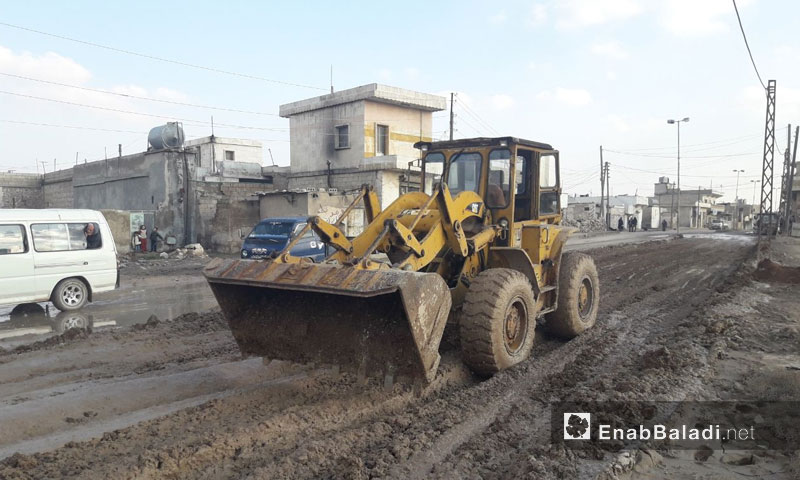



“Between each two holes, there is a third one. Each of them is half a meter deep and you can do the math,” this is how the people describe the poor state of the main and secondary roads in the northern countryside of Aleppo, amidst a total absence of restoration projects by the concerned entities.
The people in the northern countryside of Aleppo are suffering from the collapsing roads, which worsened in the winter due to rain and mud, especially with the holes created by the trucks which carry tons of materials, passing through “Bab al-Salama” border crossing with Turkey towards the eastern area, in addition to the role played by the fuel carriers which arrive at the northern countryside of Aleppo to continue their journey to the western countryside and the city of Idlib.
Despite the fact that the dilemma is a general one, the roads in certain villages and towns are “really poor,” according to the people, which triggered the need to start with band-aid solution to restore them, with the participation of the local councils in the towns of Dabiq, Suran and Akhtarin on Monday, February 5.
The Local Councils are spreading layers of babbles and remnants of dirt, then they are extremely pressed, in the form of a temporary solution in an attempt to decrease the troubles and difficulties of using these roads, waiting for the process that would completely rehabilitate and asphalt them.
In an interview with Enab Baladi, Ahamd Hamedi, the Director of the Service Office at the Dabiq town Local Council, said that the public road is still unqualified, “we received many promises from different organizations, but a single project has not yet been implemented in the area.”
“We are working in a primitive manner according to the available resources and capabilities,” as Hamedi put it, who pointed out to the disruption of the water and sewage networks on the road, indicating that the “process of cleaning the road and covering it with babbles started with the help of the Local Council in Akhtarin, to begin the second phase later on.”
According to Hamedi, the local councils have received promises from the Turkish Government that restoring and asphalting the road from Azaz to the city of al-Bab will start early in April.
“Roads in the northern and eastern countryside are roads only be name, but they are not qualified even for animals to walk on them,” Bader Kajack, a young man from the northern countryside of Aleppo, told Enab Baladi that “machinery and cars are facing a lot of trouble in moving, which repeatedly led to slips and accidents.”
The young man appealed to the local councils and the civil society organizations, as well as the concerned entities inside Syria and abroad “to show regard in the shadow of the total lack of service projects.”
Ramzi al-Basha, from the town of Suran, commented on the absence of projects “the northern countryside is in need for many reformations, after a year of forcing the Islamic State out,” pointing out that “the organizations conduct studies and disappear, while the rods remain in a deplorable situation.”
Abdel Salam Kassem, an ambulance driver in rural Aleppo, observes the situation through his work; he said that the patient is the center of his work and described the state of the roads as “disastrous.”
“As if you are driving in a valley or a mountain,” he added to Enab Baladi, pointing out that “most of the patients’ conditions worsen because of the holes and the poor roads,” explaining that “the road from Dabiq to Azaz is wicked. It is the same in Ihtaimlat, Suran and Kufra. However, the road from Yhmour to Azaz (eight kilometers)is better than the others.”
The road from the town of Dabiq to Azaz (20 kilometers) takes about an hour or an hour and a quarter, according to the car driver, who stressed that” I must drive carefully,” wishing that it would be reformed very soon.
if you think the article contain wrong information or you have additional details Send Correction